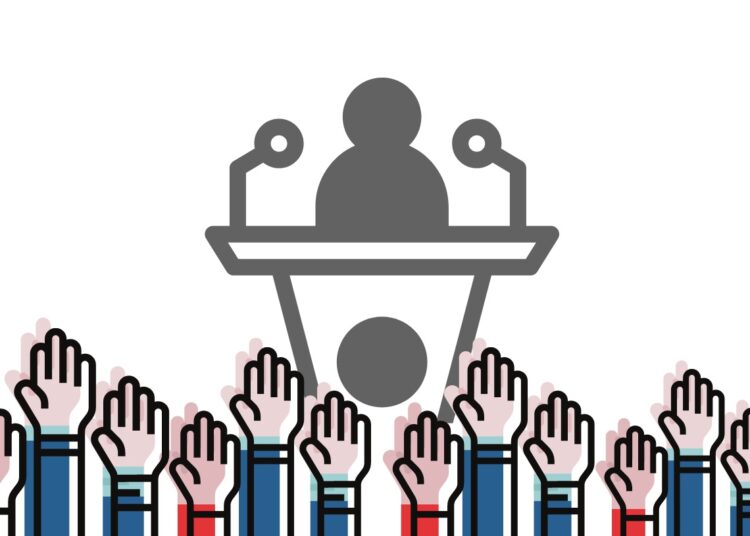The other day I found out that in 2017 a famous British dictionary chose the word “populism” as “Word of the Year.”
At the expense of remaining in the hype seven years later, as we would say here, the label “populist” has been used for so many different things, that it often confuses more than it explains.
Populists have been defined as those who appeal to a crusade against established political structures, parties of all colors, state institutions, powerful elites, decision-making centers from “above,” in the name of a generic block called “the people,” which resides “below.” No matter how many groups, social classes, ideological creeds, or political convictions are involved, this multiple subject called “the demos” or “the plebs” turns out to be “the people.” The leader, movement, or party that embodies it, no matter its ideology, identifies itself as populist.
Historically, the term “populist” was associated with the classic parties called thus in Russia or the United States, clearly left-wing, or with the fascist movements in Italy and Germany, clearly the opposite. As has happened with other concepts ― let’s say, totalitarianism, authoritarianism, radicalism, or even fascism ― its application has been stretched and its meaning has become blurred, while it covers more and more diverse cases.
As is known, the term extends to political extremes from the right to the left. Within this large bag of populists have included, for example, the neoliberal Alberto Fujimori and the nationalist general Juan Velasco Alvarado in Peru, Getulio Vargas and Jair Bolsonaro in Brazil, the socialist Marmaduke Grove and the ultra-right wing José Antonio Kast in Chile, the dictator Juan Vicente Gómez and President Hugo Chávez in Venezuela, General Juan Domingo Perón and the ultra-liberal Javier Milei in Argentina, the Mexican oil nationalizer Lázaro Cárdenas and the neoliberal Vicente Fox.
Likewise, numerous leaders from Africa have been included, from the anti-colonialists Kwame N’Krumah and Samora Machel, the founder of the Non-Alienated Movement Gamal Abdel Nasser and the anti-apartheid leader Nelson Mandela, to military allies of neocolonialism such as Mobutu Sese Seko and Idi Amin Dada.
Recovering the concept to understand current political phenomena is not a mere intellectual or academic exercise. Beyond its occurrence in political and media language, the concept serves to distinguish key aspects of these phenomena right now.
For this practical purpose, the first clarification would have to distinguish between political currents rooted in social resistance movements, arising from below, among groups lacking the means of power, in the networks of civil society and the political organizations that articulate them, on the one hand; and something as simple as “a people’s movement against the elite,” on the other. These are different animals, by their nature.
If among the leaders of these social and political movements arising from below, leadership styles are identified that can be described as populist, this does not reduce the scope and roots of these movements to the personal stamp of these leaders. In other words, enclosing under the label of populism the revolutionary processes, the underlying social and cultural changes that accompany them, their scope and significance, is a way of dismissing them with a single word.
Studies on contemporary populism agree that it is embodied in leaders who take advantage of circumstances of crisis and social conflict to capitalize on people’s discontent. These leaders can manifest themselves as “knights-errant” in search of followers, without a pre-established organization; but they can also create them ad hoc, in their image and likeness. Likewise, populists with the right gifts can take previously existing organizations and galvanize them, breathing new energy into them, in exchange for making them serve their agenda and interests.
Instead of Third World countries, supposedly plagued by caudillos, nationalisms, and revolutions, populisms have recently re-emerged in geopolitical spaces where they were said to have been banished. Let’s say, in Western European countries, where right-wing populism was a thing of the past, such as Germany; or was mostly attributed to the old left, such as France; or was associated with isolationist nationalism, such as the United Kingdom. These are the cases of the Alternative for Germany (AFD) party, with 83 seats in the last parliamentary elections; Marine Le Pen’s National Front, which has just put the last French elections in tenterhooks; the British Independence Party, which promoted the Brexit campaign and managed to break with the European Union.
Even though this rampant populism of our days is not confined to a specific ideology, it generally tends to mix the old pretensions of being the voice of the people with the tones of an almost always right-wing authoritarianism.
Now, what is the context in which current populisms emerge, not only in Latin America but in Western Europe and the United States? What factors favor their reappearance even in party systems that had remained relatively impermeable to the entry of “knights (or female knights) errant”?
On the side of political institutions, a main factor is the obsolescence of these party systems, their inability to gather the demands and interests of the people and their loss of credibility.
The signs of this stagnation are not new, nor are they expressed only as gaps for populism. Among other symptoms, they are revealed in the rapid deterioration of newly elected governments, the unpredictability and narrow margins of electoral results, the repeated practices of abuse of power and corruption, the progressive legitimization of authoritarian (or “semi-authoritarian”) exits as an alternative and, above all, the inability of the really existing democratic order to respond to the promise of a standard of living, security, well-being, justice, citizen rights.
On the other hand, taking advantage of the effect of all the above on people, populist leaders manage to elicit old phobias and alienations banished from the politically correct. Xenophobia, racism, misogyny, homophobia, religious intolerance, anti-intellectualism, puritanism, inherited taboos, and prejudices, latent in the shell of families and regions, which underlie the dark side of popular culture.
At the popular level, the fatigue of democratic ceremonies, the lack of faith in their representatives, the emptying of political ideas and the discredit of politicians (not only among the new generations), the distrust of political agents who manipulate and misinform, create the perfect space for populist leaders, with a little cunning, to go viral, so to say.
To study it as a current phenomenon, some authors have recovered populism as a differentiating concept of a certain political style. This update of the concept focusing it on the style of leadership highlights three main characteristics.
The first is based on the old scheme of appealing to the “people” to oppose “the elite.” But with some peculiarities that make it particularly skimming. Ignoring the diversity of interests and actors, social subjects and political currents that make up the real people, this vision defines two blocs: “we, the people,” where the only truth exists, conceived in a fundamentalist way; and “our adversaries,” the epitome of all evils, which only deserves to be denied. Instead of normal confrontation or competition in the theater of politics, this denial leads to political polarization, with its load of verbal, psychological, and even physical violence.
The second characteristic enthrones a style of political debate marked by the breaking of the patterns of correctness and even decency. Derived from extreme polarity, rudeness and “bad manners,” snubs and defiance (bravado, we would say) become instrumental. This style incorporates the “people” as an audience, a kind of fanatics around a boxing or wrestling ring, to encourage each punch of the opponent. So that the treatment is stripped of all respect, that is, anything goes, low blows included.
The third characteristic is to integrate the crisis into the exercise of leadership, to use it as a weapon and threat. This way of operationalizing the crisis preaches being ready for anything due to the gravity of the moment. As they would say in Cabaiguán, in a less grandiose tone, it is about “stirring things up,” to scare both followers and opponents. It is not strange that some populists bring to mind evangelical preachers, for their apocalyptic tone, as a trumpet to save “our civilization,” “our nation,” “our legacy.” Etcetera.
In this prophetic and ultra-nationalist line, they mistrust international alliances and pacts, defend isolationist policies, and exalt a strong leadership that concentrates authority in the style of “great evils, great remedies.” This defiant attitude toward the established order and without mincing words gives populist leaders an aura of courage, frankness, and invincibility that attracts their followers.
The reader must suspect that this populism of leadership is inseparable from information and communication technologies. And since politics is not a separate thing, it is logical that all the characteristics mentioned above are enhanced under the empire, use, and abuse of social media.
Currently, some authors have coined the term digital populism to study these uses, and in particular “influencing the electorate, raising suspicions about electoral processes and spreading disinformation.”
If we are talking about populist leadership, what distinguishes digital media, in addition to its enormous scale in scope and saturation, would be the possibilities of multiplying the space of politics, of acting it out in any scenario, erasing or making more tenuous the difference between the real and the virtual, the factual and the represented, in the manner of performance artists.
Just as ideas and actions acquire meaning and raison d’être for those who participate in this populist political performance, it is not strange that fake news turns out to be as “objective” and functional as other news.
In this strange world that we apparently share, where we have become accustomed to anyone saying anything and nothing happens, it is not surprising that an exchange of insults can be taken as a debate of ideas, that the guidance of the majority comes from so-called influencers, that politics is a spectacle, and its development depends more on dramatic effects than on the demonstrated capacity and strength of leadership.
How can we build alternative practices that rescue the very meaning of politics, both at the top and the bottom, without going back to ritual formulas, to solemn and formal ceremonies, lacking passion and interest, to involve people of all ages and motivate them to participate consciously? Is there something that accompanies populism that left-wing politics and leaders should learn to exercise? Is there a way to develop a critical consciousness that resists the tricks of populism in this globalized world and a transnationalized society like ours?
We should think about it, I say.










